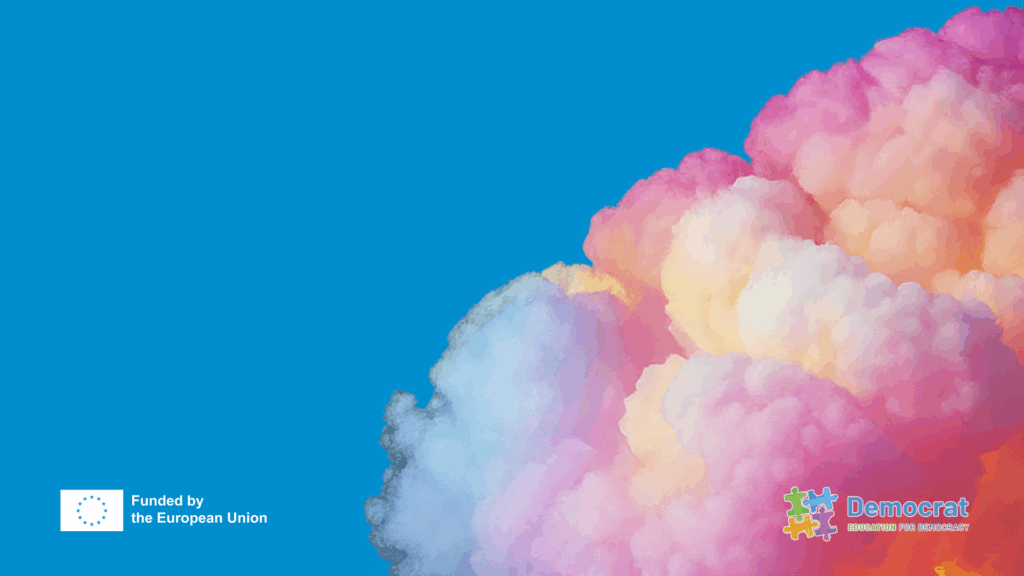Feeling Our Way to Democracy

Why emotional work belongs at the heart of education
When we talk about democracy, we often think about debate, participation, and critical thinking — but what about feeling? Our new article, Emotional work for more holistic and transformative Education for Democracy, invites educators, policymakers, and school leaders to look deeper: to see emotions not as side effects of learning, but as the very engine that drives democratic transformation.
The missing piece in education for democracy
For decades, Education for Democracy (EfD) has focused on cognitive skills — reasoning, analysis, debate. Yet as Hytti and Sandström point out, democracy is also deeply emotional: “Emotions shape how we think, relate, and act.” Without understanding how emotions guide our choices, reactions, and relationships, civic learning remains incomplete.
Our paper calls for placing emotional work, i.e. the reflective and embodied engagement with emotions, atà the center of EfD. We argue that genuine democratic transformation happens in the micro-moments of learning when we attend to and work through emotions rather than push them aside.
What emotional work looks like
Emotions are not external to learning but part of its inner architecture — they shape attention, interpretation, and action. Recognising and engaging with emotions as they unfold enables learners to connect thinking and feeling as interdependent dimensions of understanding. When educators help students to identify, feel, process, reflect on, and navigate emotions, emotional work becomes a transformative practice rather than an incidental one.
Reflective practice — for instance, noticing, feeling, and navigating emotions as they arise in learning — can make democratic education more durable, actionable, and humane. Guided, facilitated emotional work strengthens empathy, critical thinking, and prosocial behaviour, all key competences for active democratic participation.
To bring this into classrooms, we suggest:
- creating safe spaces where discomfort signals learning rather than threat,
- using embodied practices — movement, arts-based reflection, mindful pauses — to surface and process emotions,
- negotiating emotional norms so that diverse voices can participate respectfully,
- prioritising trust and care alongside academic rigor, since belonging and safety enable true dialogue.
The science behind it
Building on Dewey’s view that emotion is integral to experience and growth, our framework draws from contemporary research linking emotional work, transformation, and democratic competence. Transformative learning, being closely connected with civic education (Hoggan-Kloubert & Mabrey, 2022), provides the foundation for our approach. Drawing on Carter & Nicolaides (2023) and Sánchez & Sebastián (2024), we show that embodied engagement with emotions is inseparable from genuine transformation in democratic learning.
Emotions, in this view, are not separate from cognition but deeply interwoven with it — shaping perception, motivation, and meaning-making throughout the learning process. Recognising, feeling, navigating, and reflecting on emotions are therefore not peripheral skills but central pathways for developing democratic competence and agency.
We also synthesise studies on discomfort and edge emotions (Zembylas, 2013; Mälkki, 2011, 2019; Mälkki, Mäkinen & Forsell, 2022), which highlight that emotions often perceived as unpleasant can actually mark moments of deep learning. When supported by social scaffolds (Kong, Ding & Zhao, 2015), such emotional engagement can catalyse empathy, tolerance, and the capacity to handle complexity in democratic life (Caleon et al., 2019).
So what?
At a time when democratic societies face polarisation, misinformation, and erosion of trust, we argue that learning to feel democratically is as vital as learning to think critically. Emotional literacy is the capacity to reflect on and regulate emotions collectively and it strengthens resilience, inclusion, and the capacity to act together for the common good.
In short: if democracy depends on people, it must also depend on their emotional worlds.
The full open-access article (Hytti & Sandström, 2025) is available here:
More from Democrat
From Protest to Participation: Fostering Democratic Agency in Young People
Schools as Spaces of Democracy: How Participation Contributes to a Democratic School Culture
Education for Democracy: Building a Peaceful Future Through Learning